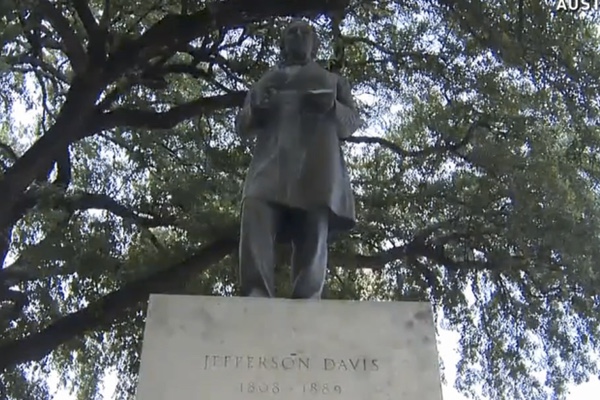Leave the Confederate Statues in Place. But Change the Inscriptions.

Since a white loser (in the literal and figurative sense) murdered nine black Christians under the banner of the Stars and Bars, there have been increasing demands to remove this flag and the names and statues of those who served it from public buildings and facilities. But opponents have denounced them as Orwellian exercises in political correctness. History is admittedly messy, and that of the Civil War era particularly so. But Neo-Confederates are willfully blind to the political correctness of an earlier era that prevented naming any public facilities after Southern Unionists, and even required a re-dedication of Walker County, Texas, to a new namesake when the original honoree, Robert J. Walker of Mississippi, (who introduced into the United States Congress the resolution for the annexation of Texas), turned out to be a Unionist. Texas has various official sites named after Mississippian Jefferson Davis, but nothing after Texan Edmund Davis, for the simple reason that he was a Unionist and a Republican Governor. Why not do the same thing with Ft. Davis as the Confederates did with Walker County: re-dedicate it to a Unionist patriot, Edmund Davis?
Southern revisionists even went so far as to change the name of the Civil War (the term promoted by Jeff Davis instead of the Yankees label, used even in their official publications, “The Rebellion”), to the War Between the States. What is truly Orwellian is the suppression of the memory of Southern Unionism and postwar recantations. Robert E. Lee’s most trusted and competent lieutenant, James Longstreet, felt commemoration in the South was anathema because he became a Republican and commanded the biracial Louisiana state militia after the war. Another prominent ex-Confederate Republican, John S. Mosby, remarked: "There was more vindictiveness shown to me by the Virginia people for my voting for Grant than the North showed to me for fighting four years against him."
Even descendants of dissenters sometimes try to retrofit their ancestors to the Southern master narrative. When I showed the SPJST Czech fraternal cemetery west of Caldwell to a Czech doctoral student (and Civil War re-enactor), he burst out laughing at the sight of two graves whose stones were augmented with Confederate veteran markers: “Those guys were both deserters!” You would never know from the number of monuments to each side (72: 2) that over two-thirds of the soldiers from Kentucky served the Union.
Kentucky’s Unionism caused John B. Hood to renounce his native state and declare himself a Texan. If we must dedicate a U.S fort to Hood, who epitomized two quintessential Confederate characteristics: bravery and stupidity, we should post at the gate a sign inscribed with a quote from another Texas Confederate, Senator Louis Wigfall: “That young man had a fine career before him until [Jefferson] Davis undertook to make of him what the good Lord had not done—to make a great general of him.”
We could apply the same principle on the University of Texas campus: keep the Confederate statues but replace their revisionist Lost Cause inscriptions with new, genuine captions from statements actually made during the Civil War.
For Albert Sidney Johnston, use his rallying cry on the eve of his death and defeat at Shiloh: “You can but march to a decisive victory over agrarian mercenaries, sent to subjugate and despoil you of your liberties, property, and your honor.” Agrarian? I thought the Rebs were fighting for agrarianism and against industrial society. Mercenaries? Just days after the Confederates had enacted the first military draft in American history. And just what property might he be referring to? We know, don’t we?
For Robert E. Lee, one could hardly do better than a declaration from the Richmond Examiner. In the desperate days of early 1865 when Lee advocated recruiting black soldiers for his army, the Examiner opined that Lee’s proposal “suggests a doubt whether he is what used to be called ‘a good Southerner’; that is, whether he is thoroughly satisfied of the justice and beneficence of [N]egro slavery as a sound, permanent basis of our national polity.”
For Jefferson Davis, nothing would be more appropriate than the prophetic warning of Sam Houston: "When the tug of war comes ... the fearful conflict will fill our fair land with untold suffering, misfortune, and disaster. The soil of our beloved South will drink deep the precious blood of our sons and brethren. ... I cannot, nor will I close my eyes against the light and voice of reason. The die has been cast by your secession leaders, whom you have permitted to sow and broadcast the seeds of secession, and you must ere long reap the fearful harvest of conspiracy and revolution. . . . But the hiss of the mob and howls of their jackal leaders can not deter me nor compel me to take the oath of allegiance to a so-called Confederate Government." Although secessionists hounded Houston from office, we can at least be grateful that Southern revisionists left unscathed his name on a great Texas city.